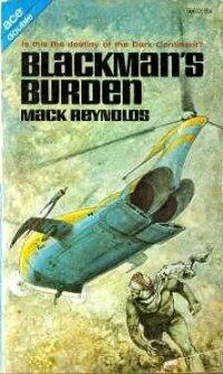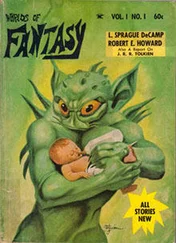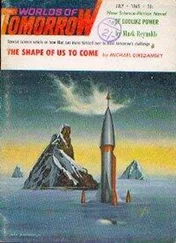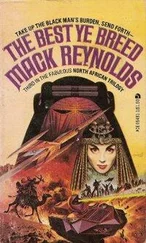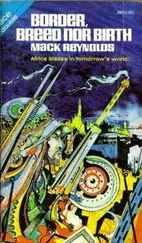Mack Reynolds
Blackman’s Burden
“Take up the white man’s burden
Send forth the best ye breed…”
—
Kipling
The two-vehicle caravan emerged from the sandy wastes of the erg and approached the small encampment of Taitoq Tuareg which consisted of seven goat leather tents. They were not unanticipated; the camp’s scouts had noted the strange pillars of high-flung dust which were set up by the air rotors an hour earlier and for the past fifteen minutes they had been visible to all.
Moussa-ag-Amastan, headman of the clan, awaited the newcomers at first with a certain trepidation in spite of his warrior blood. Although he hadn’t expressed himself thus to his followers, his first opinion had been that the unprecedented pillars were djinn come out of the erg for no good purpose. It wasn’t until they were quite close that it could be seen the vehicles bore resemblance to those of the Rouma which were of recent years spreading endlessly through the lands of the Ahaggar Tuareg and beggaring those who formerly had conducted the commerce of the Sahara.
But vehicles traveling through the sand dunes! That had been the last advantage of the camel. No wheeled vehicle could cross the vast stretches of the ergs; they must stick to the hard ground, the tire-destroying gravel.
They came to a halt and Moussa-ag-Amastan drew up his teguelmoust turban-veil even closer about his eyes. He had no desire to let the newcomers witness his shocked surprise at the fact that the desert lorries had no wheels, floated instead without support, and now that they were at a standstill settled gently to earth.
There was further surprise when the five who issued forth from the two seemingly clumsy vehicles failed to be Rouma. They looked more like the Teda to the south, and the Targui’s eyes thinned beneath his teguelmoust. Since the French had pulled out their once dreaded Camel Corps there had been somewhat of a renaissance of violence between traditional foes.
However, the newcomers, though dark as Negro Bela slaves, wore Tuareg dress, loose baggy trousers of dark indigo-blue cotton cloth, a loose, nightgownlike white cotton shirt, and over this a gandoura outer garment. Above all, they wore the teguelmoust, though they were shockingly lax in keeping it properly up about the mouth.
Moussa-ag-Amastan knew that he was backed by ten or more of his clansmen, half of whom bore rifles, the rest Tuareg broadswords, Crusader-like with their two edges, round points and flat rectangular cross-members. Only two of the strangers seemed armed and they negligently bore their smallish guns in the crooks of their arms. The clan leader spoke at length, then, but he said the traditional, “ La bas .”
“There is no evil,” repeated the foremost of the newcomers. His Tamaheq, the Berber language of the Tuareg confederations, seemed perfect.
Moussa-ag-Amastan said, “What do you do in the lands of the Taitoq Tuareg?”
The stranger, a tall, handsome man with a dominating though pleasant personality, indicated the vehicles with a sweep of his hand. “We are Enaden, itinerent smiths. As has ever been our wont, we travel from encampment to encampment to sell our products and to make repair upon your metal possessions.”
Enaden! The traveling smiths of the Ahaggar, and indeed of the whole Sahara, were a despised and ragged lot at best. Few there were that ever possessed more than a small number of camels, a sprinkling of goats, perhaps a sheep or two. But these seemed as rich as Roumas, as Europeans or Americans.
Moussa-ag-Amastan muttered, “You jest with us at your peril, stranger.” He pointed an aged but still strong hand at the vehicles. “Enaden do not own such as these.”
The newcomer shrugged. “I am Omar ben Crawf and these are my followers, Abrahim el Bakr Ma el Ainin, Keni Ballalou and Bey-ag-Akhamouk. We come today from Tamanrasset and we are smiths, as we can prove. As is known, there is high pay to be earned by working in the oil fields, at the dams on the Niger, in the afforestation projects, in the sinking of the new wells whose pumps utilize the rays of the sun, in the developing of the great new oases. There is much Rouma money to be made in such work and my men and I have bought these vehicles specially built in the new factories in Dakar for desert use.”
“Slave work!” one of Moussa-ag-Amastan’s kinsmen sneered.
Omar ben Crawf shrugged in obvious amusement, but there was a warmth and vitality in the man that quickly affected even strangers. “Perhaps,” he said. “But times change, as every man knows, and today there no longer need be hunger, nor illness, nor any want—if a man will but work a fraction of each day.”
“Work is for slaves,” Moussa-ag-Amastan barked.
The newcomer refused to argue. “But all slaves have been freed, and where in the past this meant nothing since the Bela had no place to go, no way to live save with his owner, today it is different and any man can go and find work on the many projects that grow everywhere. So the slaves slip away from the Tuareg, and the Teda and Chaamba. Soon there will be no more slaves to do the work about your encampments. And then what, man of the desert?”
“We’ll fight!” Moussa-ag-Amastan growled. “We Tuareg are warriors, bedouin, free men. We will never be slaves.”
“ Inshallah . If God wills it,” the smith agreed politely.
“Show us your wares,” the old chieftain snapped. “We chatter like women. Talk can wait until the evening meal and in the men’s quarters of my tent.” He approached the now parked vehicles and his followers crowded after him. From the tents debouched women and children. The children were completely nude, and the Tuareg women were unveiled, for such are the customs of the Ahaggar Tuareg that the men go veiled but the women do not.
One of the lorries was so constructed that a side could be raised in such fashion as to display a wide variety of tools, weapons, household utensils, and textiles. Ohs and ahs punctuated the air, women being the same in every land. Two of the smiths brought forth metal-working equipment of strange design and set up shop to one side. A broken bolt on an aged Lebel rifle was quickly repaired, a copper cooking pot brazed, some harness tinkered with.
Of a sudden, Moussa-ag-Amastan said, “But your women, your families, where are they?”
The one who had been introduced as Abrahim el Bakr, an open-faced man whose constant smiling seemed to take a full ten years off what must have been his age, explained. “On the big projects, one can find employment only if he allows his children to attend the new schools. So our wives and children remain near Tamanrasset while the children learn the lore of books.”
“Rouma schools!” one of the warriors sneered.
“Oh, no. There are few Roumas remaining in all the land now,” the smith said easily. “Those that are left serve us in positions our people as yet cannot hold, in construction of the dams, in the bringing of trees to the desert, but soon even they will be unneeded.”
“ Our people?” Moussa-ag-Amastan rumbled ungraciously. “You are smiths. The smiths have no people. You are neither Kel Rela, Tegehe Mellet, Taitoq, nor even Teda, Chaamba, or Ouled Tidrarin.”
One of the smiths said easily, “In the great construction camps, in the new towns, with their many ways to work and become rich, the tribes are breaking up. Tuareg works next to Teda and a Moor next to a former Haratin serf.” He added, as though unthinkingly, even as he displayed an aluminum pan to a wide-eyed Tuareg matron, “Indeed, even the clans break up and often Tuareg marries Arab or Sudanese or Rifs down from the north … or even we Enaden.”
Читать дальше
